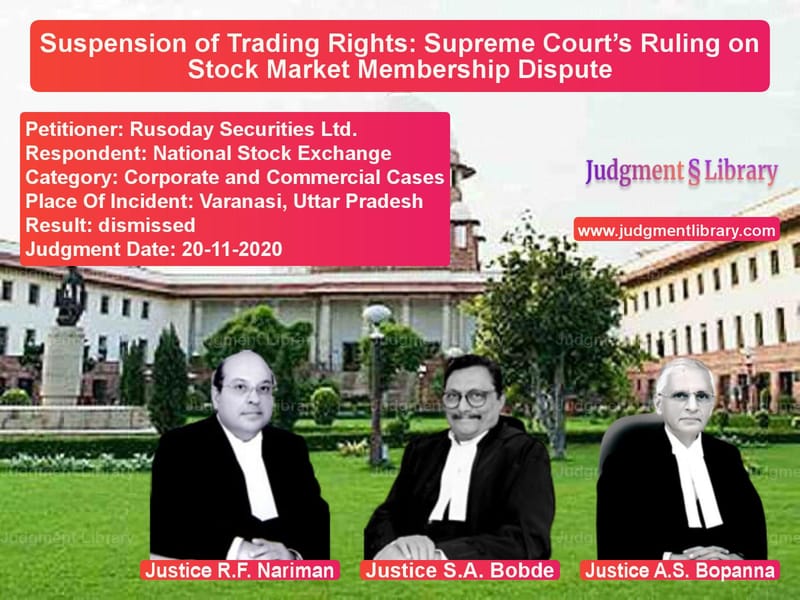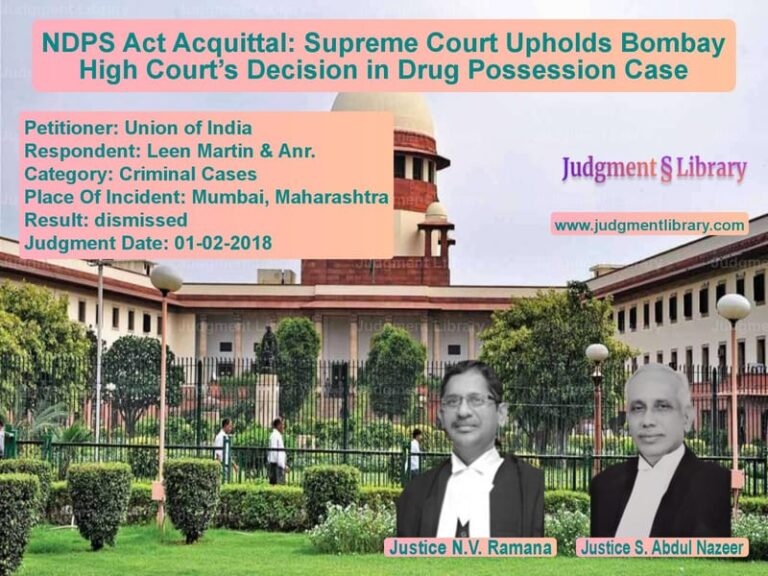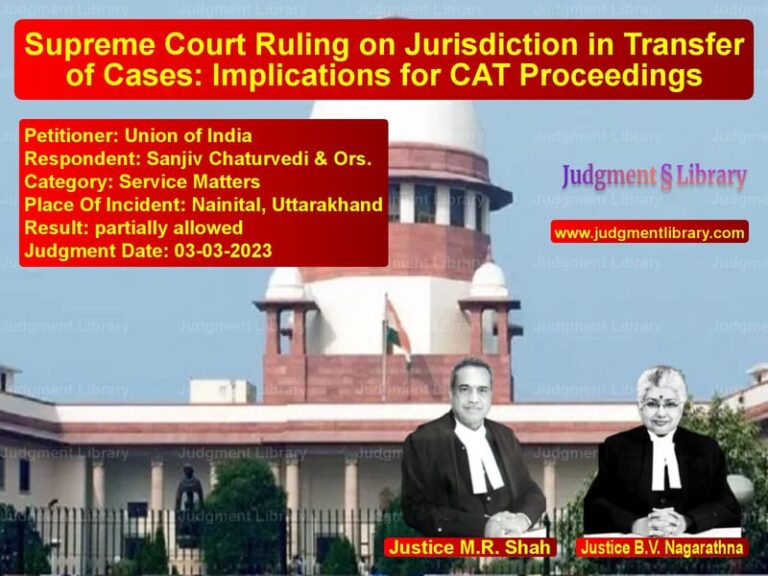Suspension of Trading Rights: Supreme Court’s Ruling on Stock Market Membership Dispute
The case involves a legal battle between the appellant, Rusoday Securities Ltd., and the National Stock Exchange (NSE) concerning the suspension of the appellant’s trading membership. The appellant challenged the withdrawal of trading facilities, which was imposed due to alleged violations of trading exposure limits and capital adequacy norms. The issue central to this case revolves around the legality of the suspension and the procedures followed by the NSE in enforcing such measures under their regulatory framework.
Background of the Case
Rusoday Securities Ltd., an active member of the NSE, had its membership suspended due to the failure to meet certain trading standards as outlined by the Exchange’s byelaws and regulations. The appellant’s trading privileges were withdrawn, and the Trading Rights were suspended by the NSE after allegations of exceeding the prescribed exposure limits and not adhering to the necessary capital adequacy norms.
The appellant filed a petition against the action, arguing that the suspension was without sufficient cause and was imposed without due process. Additionally, the appellant claimed that the NSE’s circular imposing restrictions was not binding on them and was, therefore, unlawful.
Petitioner’s Arguments
The petitioner, Rusoday Securities, raised the following arguments:
- The NSE’s action to suspend their trading rights was unlawful and in violation of the Byelaws and regulations of the Exchange.
- Despite paying the required security deposits, the appellant was subjected to unfair treatment, and their suspension was imposed arbitrarily without fair opportunity for defense.
- The circular issued by the NSE imposing restrictions on trading limits was not binding upon them as it was not a duly ratified document under the existing norms.
- The appellant had been operating in good faith and was compliant with all regulatory requirements as per the original contract.
“The withdrawal of trading privileges without proper legal foundation and without adhering to the agreed procedures and byelaws has harmed our client’s business, violating their fundamental rights to fair treatment under the law.”
Respondent’s Arguments
The NSE, represented by its legal team, argued the following:
- The appellant’s trading privileges were suspended due to a breach of trading exposure limits and failure to meet capital adequacy standards, which were essential for market stability.
- The NSE was within its rights to take action under its byelaws to prevent any harm to the broader market, and such actions were consistent with regulatory practices.
- The circular imposing restrictions was a valid and enforceable document, and the appellant had been adequately informed of the trading limits and requirements.
- The actions taken by the NSE were in line with the powers granted to the Exchange under the regulatory framework, and the appellant’s claims lacked merit.
“The action taken against Rusoday Securities was necessary to preserve the integrity of the financial market. The petitioner’s non-compliance with the trading regulations created a significant risk to the Exchange and other market participants.”
Supreme Court’s Judgment
The Supreme Court, in its final ruling, observed the following key points:
- The Court upheld the authority of the NSE to take appropriate actions to ensure the integrity of the stock market by enforcing its byelaws and regulations. The appellant’s failure to comply with the exposure limits and capital adequacy norms was a breach of the Exchange’s fundamental rules.
- The Court noted that while it is essential to safeguard market participants, the regulatory body (NSE in this case) must also ensure that actions taken are in accordance with established procedures and provide fair notice and opportunity for compliance.
- The appellant was found to have failed to meet the necessary criteria as per the Exchange’s regulations, which justified the suspension of its trading rights.
- The Supreme Court emphasized that the regulatory framework exists to maintain market integrity, and the powers granted to the Exchange under these regulations were exercised lawfully and in good faith.
“The actions taken by the NSE to suspend the appellant’s trading rights were justified under the existing regulatory framework. The Exchange has the right to enforce its byelaws to ensure the proper functioning of the market.”
Conclusion
The Supreme Court dismissed the appellant’s petition and upheld the suspension of trading privileges. The judgment reinforced the critical role of regulatory bodies such as the NSE in maintaining market integrity and ensuring compliance with established norms. It also highlighted the importance of following due process when imposing restrictions, ensuring that the actions of financial regulators are consistent with their statutory powers.
Petitioner Name: Rusoday Securities Ltd..Respondent Name: National Stock Exchange.Judgment By: Justice R.F. Nariman, Justice S.A. Bobde, Justice A.S. Bopanna.Place Of Incident: Varanasi, Uttar Pradesh.Judgment Date: 20-11-2020.
Don’t miss out on the full details! Download the complete judgment in PDF format below and gain valuable insights instantly!
Download Judgment: Rusoday Securities L vs National Stock Excha Supreme Court of India Judgment Dated 20-11-2020.pdf
Direct Downlaod Judgment: Direct downlaod this Judgment
See all petitions in unfair trade practices
See all petitions in Company Law
See all petitions in Corporate Governance
See all petitions in Judgment by Rohinton Fali Nariman
See all petitions in Judgment by S. A. Bobde
See all petitions in Judgment by A. S. Bopanna
See all petitions in dismissed
See all petitions in supreme court of India judgments November 2020
See all petitions in 2020 judgments
See all posts in Corporate and Commercial Cases Category
See all allowed petitions in Corporate and Commercial Cases Category
See all Dismissed petitions in Corporate and Commercial Cases Category
See all partially allowed petitions in Corporate and Commercial Cases Category







